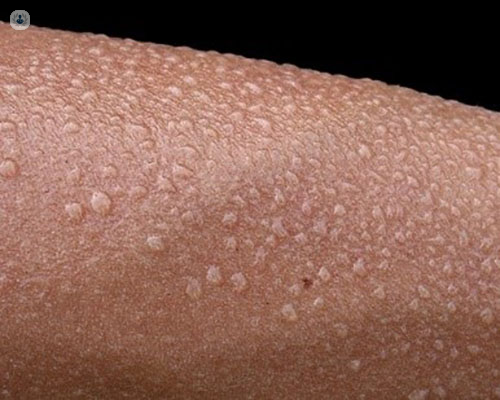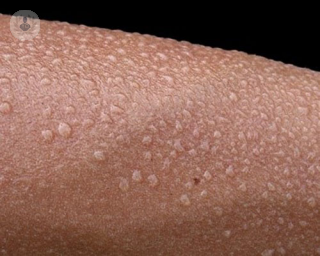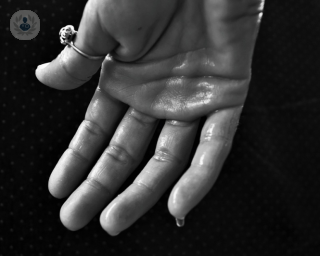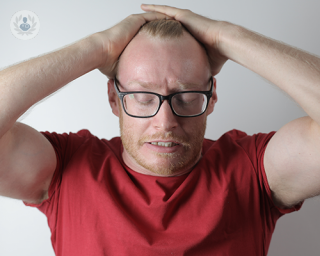Hyperhidrosis
Professor Alun Davies - Vascular surgery
Created on: 11-13-2012
Updated on: 11-08-2023
Edited by: Conor Lynch

What is hyperhidrosis?
Hyperhidrosis is a condition characterised by excessive sweating. Sweating, also referred to as perspiration, is a skin function that helps to maintain body temperature constant. However, uncontrolled, unpredictable, excessive sweating , i.e. hyperhidrosis, can adversely affect social and professional relationships.
People with hyperhidrosis have overactive sweat glands. Their uncontrolled sweating can become problematic, from an emotional as well as physical viewpoint, and can severely interfere with their everyday life as the condition develops. Hence, many people with hyperhidrosis want to avoid situations that involve physical contact, e.g. greeting somebody with a handshake. Similarly, they tend to restrict their arm movements and adopt rigid postures to hide sweating in their armpits. Among the habits that people with this condition develop, a common one is changing clothes several times a day.
Hyperhidrosis may affect only specific parts of the body such as the armpits (axillary hyperhidrosis), palms of hands and soles of feet (palmoplantar hyperhidrosis) the face (gustatory hyperhidrosis), or the whole body (generalized hyperhidrosis).
What are the main symptoms of hyperhidrosis?
The symptoms are readily apparent: excessive, uncontrolled sweating in different parts of the body with no apparent cause.
What are the causes of hyperhidrosis?
Hyperhidrosis may be primary or secondary. Primary hyperhidrosis is usually more localised, and the cause is unknown; it is obvious, however, that the sympathetic nervous system is overactive and the sweat response is excessive. Feeling tense or nervous can make the symptoms worse. In many patients, a positive feedback loop develops: they become nervous when they realise that they have started sweating, which makes them sweat more, which makes them more nervous.
Secondary hyperhidrosis is the result of an underlying clinical situation and it tends to affect the body in a more generalised manner: it can appear at different stages of the patient’s life in association with different habits, illnesses or problems (e.g. menopause, certain drugs or medications, thyroid gland problems, tumours, etc).
Can it be prevented?
Primary hyperhidrosis cannot be prevented. Secondary hyperhidrosis is associated with another clinical problem, and if the underlying problem is controlled, hyperhidrosis may be better controlled.
How is hyperhidrosis treated?
There are currently many varied treatments for hyperhidrosis:
- Treatment of hyperhidrosis with botulinum toxin: this is a straightforward treatment that can be applied to the armpits, the palms of the hand, and the soles of the feet. The toxin, injected using very fine needles, blocks the function of the sweat glands, such that sweat production in the area is lowered. The treatment usually takes about one hour and it is effective for around 6 months.
- Medico-dermatological treatments: aluminium chloride is often used as an antiperspirant, but it may cause skin irritation. Anticholinergic substances are also used, but they may have side effects.
- Surgical treatments: one technique is to eliminate the sweat glands using one of several methods. Another procedure is endoscopic thoracic sympathectomy, in which the principal thoracic ganglia of the paravertebral chain innervating the skin region that requires treatment are rendered useless. Although this technique is highly effective, compensatory sweating may develop whereby sweating starts to occur in areas that did not sweat before surgery.
Do natural deodorants work to treat hyperhidrosis?
Natural deodorants are designed to mask body odour, and are not designed to reduce one's overall sweating.
How common is hyperhidrosis?
Hyperhidrosis affects approximately one per cent of the general population.
Can hyperhidrosis be cured?
Unfortunately, there is no known cure for hyperhidrosis. Treatments that are available act by helping to reduce the amount that one sweats throughout any given day.
Can hyperhidrosis be inherited?
Yes, indeed it can. Many patients are predisposed with the condition.
Which antiperspirant is recommended for people with hyperhidrosis?
Individuals with hyperhidrosis are advised to look for antiperspirants that contain aluminium chloride. Roll-on antiperspirants tend to be more effective. Spray perspirants tend to be more useful for the feet.
When should I see a doctor for my excessive sweating?
There are certain things that should prompt an individual to see a doctor for their excessive sweating. Generally, patients are advised to seek medical advice if:
- their excessive sweating has lasted for at least six months
- their excessive sweating prevents them from getting on with daily activities
- their excessive sweating occurs at least once a week
- they notice that they are experiencing night sweats
A dermatologist can treat hyperhidrosis.















